

Why We Prefer Founding CEOs. You’re just a rent-a-rapper, your rhymes are minute-maidI’ll be here when it fade to watch you flip like a renegade”—Rakim, Follow The Leader When my partner Marc wrote his post describing our firm, the most controversial component of our investment strategy was our preference for founding CEOs.
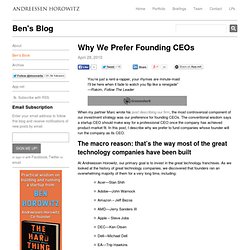
The conventional wisdom says a startup CEO should make way for a professional CEO once the company has achieved product-market fit. In this post, I describe why we prefer to fund companies whose founder will run the company as its CEO. The macro reason: that’s the way most of the great technology companies have been built At Andreessen Horowitz, our primary goal is to invest in the great technology franchises. Andreessen Horowitz. Blog.pmarca.com: Introducing our new venture capital firm Andree. My partner Ben Horowitz and I are delighted to announce the formation of our new venture capital firm, Andreessen Horowitz, and our first fund — $300 million in size — aimed purely at investing in the best new entrepreneurs, products, and companies in the technology industry.
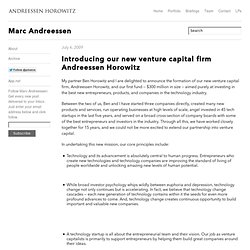
Between the two of us, Ben and I have started three companies directly, created many new products and services, run operating businesses at high levels of scale, angel invested in 45 tech startups in the last five years, and served on a broad cross-section of company boards with some of the best entrepreneurs and investors in the industry. Through all this, we have worked closely together for 15 years, and we could not be more excited to extend our partnership into venture capital. [UGC] Founding vs. Professional CEO Performance Analysis « Enabl. Steve Blank. About. My name is Ben Horowitz, and I am cofounder and Partner (along with Marc Andreessen) of the venture capital firm Andreessen Horowitz based in Menlo Park.

Prior to Andreessen Horowitz, Marc and I co-founded Loudcloud, a managed services provider (today, we’d call it a cloud service provider, but people were not quite ready for that in the early 2000s) which became Opsware, an data center automation software provider. I tell the dramatic story of how Loudcloud became Opsware and was ultimately acquired by HP in my blog post titled The Case for the Fat Startup. You can learn more about what I did prior to co-founding Loudcloud by reading my biography on Wikipedia. Why Founders Are Important To Startups - Demolishing Myths About. Posted by Tom Foremski - April 29, 2010 Over the years there has been much written about startup teams and how different stages of a startup require a different mix of skills and thus different teams.
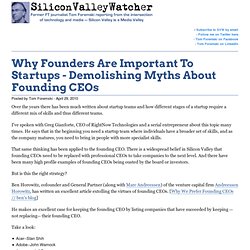
I've spoken with Greg Gianforte, CEO of RightNow Technologies and a serial entrepreneur about this topic many times. He says that in the beginning you need a startup team where individuals have a broader set of skills, and as the company matures, you need to bring in people with more specialist skills. That same thinking has been applied to the founding CEO.
There is a widespread belief in Silicon Valley that founding CEOs need to be replaced with professional CEOs to take companies to the next level. But is this the right strategy? Ben Horowitz, cofounder and General Partner (along with Marc Andreessen) of the venture capital firm Andreessen Horowitz, has written an excellent article extolling the virtues of founding CEOs. Who Says Elephants Can't Dance? Inside IBM's Historic Turnaround. Blog.pmarca.com. Nine years later does Google still need 'adult supervision?' In preparing Google for its IPO, its VC investors convinced Google founders Larry Page and Sergey Brin to bring in an older executive to assure potential investors that there was some 'adult supervision.' This worked and the GOOG IPO in 2004 was a huge success.
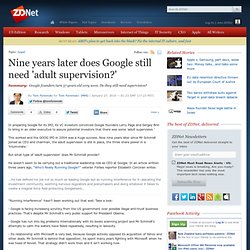
Now nine years later since Mr Schmidt joined as CEO and chairman, the adult supervision is still in place, the three share power in a 'triumvirate.' But what type of 'adult supervision' does Mr Schmidt provide? He doesn't seem to be carrying out a traditional leadership role as CEO at Google. In an article written three years ago, "Who's Really Running Google? " Silicon Valley Watcher - at the intersection of technology and m. There's been much written recently about angel investors and venture capitalists especially about the rise of the "super angels" such as Ron Conway, Jeff Clavier, Marc Andreessen, etc.
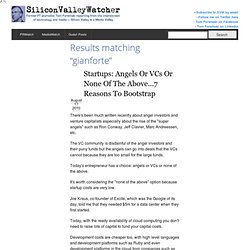
The VC community is disdainful of the angel investors and their puny funds but the angels can go into deals that the VCs cannot because they are too small for the large funds. Today's entrepreneur has a choice: angels or VCs or none of the above. It's worth considering the "none of the above" option because startup costs are very low. Joe Kraus, co-founder of Excite, which was the Google of its day, told me that they needed $5m for a data center when they first started. Today, with the ready availability of cloud computing you don't need to raise lots of capital to fund your capital costs. Development costs are cheaper too, with high level languages and development platforms such as Ruby and even development platforms in the cloud from companies such as Engine Yard, development is quick and scalable. . . .